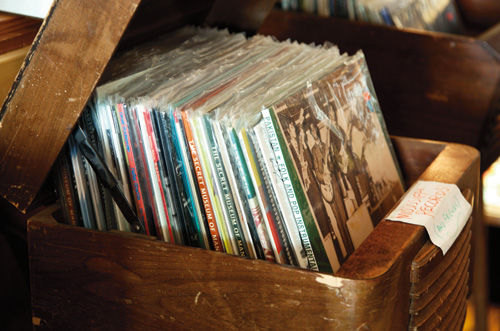 Portland’s niche vinyl shops defy the national trend and continue to grow.
Portland’s niche vinyl shops defy the national trend and continue to grow.
BY CHRISTINA COOKE
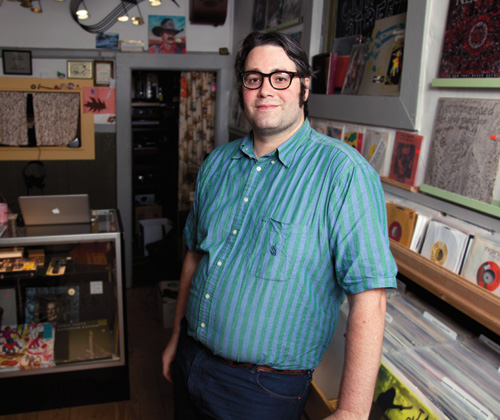 |
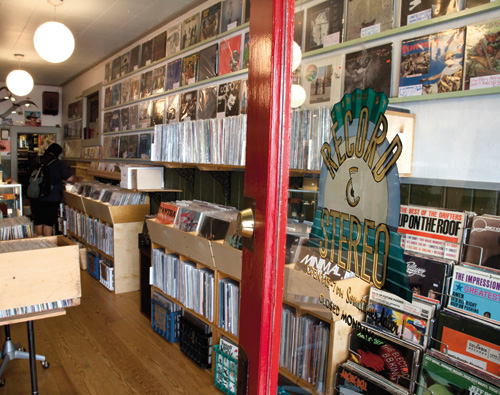 |
R. Jared White says the new-arrival bin at his vinyl shop, Clinton Street Record & Stereo, turns over about once a week. “My main thing is keeping people excited about music and keeping this format going,” he says.// Photos by Sierra Breshears |
Behind the sales counter along the back wall of Clinton Street Record & Stereo, an ’80s synth-funk album spins on the turntable beside R. Jared White. A DJ whose expertise ranges from gangsta rap to goth, White and his business partner opened the Southeast Portland record store two years ago despite the fact that record stores everywhere else were closing.
Since music moved from physical to digital formats in the early 2000s, the record-store industry in the U.S. has been struggling. The number of record stores has declined an average of 22% per year over the past five, according to industry analyst IBISWorld, and it’s expected to continue declining an average of 4% per year until 2017.
White wasn’t worried about his venture, though, because he considers what he sells a completely different product — much more tangible — than a downloaded song.
“You can pretty much touch the music,” he explains, reaching over and scratching the spinning record.
Despite the doom and gloom in the industry as a whole, Portland’s independent record-store scene has burgeoned over the past few years. Of the 25 independent record shops within the city limits, 13 have opened over the past decade, eight in the past six years.
In addition to Clinton Street, establishments such as Exiled Records, Mississippi Records, Record Room, Beacon Sound, Boom Wow! Records and Little Axe Records have set up shop since the industry began to plummet.
“It’s the inverse of what’s happening everywhere else,” says Eric Isaacson, who opened Mississippi Records in 2003. “I don’t understand it, exactly.”
Distinct from the larger, older Portland music shops like Music Millennium, Everyday Music and Jackpot Records, which are established cultural entities with loyal clientele, most of the music shops in the new wave share a number of characteristics. They are tucked into physically small spaces. They sell almost exclusively vinyl, both new and used. Their owners, who can usually be found working the sales floors, are die-hard music lovers who carefully curate their collections and stock deep rather than broad.
Each shop distinguishes itself from others by specializing in a certain type of music — be it punk, psychedelic, electronic, rock or world — though the owners’ personalities also set each apart. Selections range from the $1 to $2 records in the discount bins to the $10 to $20 standard fare to $100-plus collectors’ items. And while the shops make enough money to perpetuate themselves, they don’t make much more.
“They’re all squeaking by,” Isaacson says. “It’s less a money-making thing and more a cultural thing.”
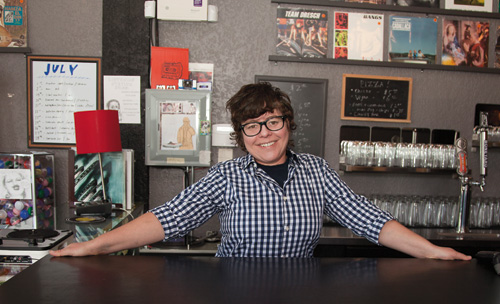 |
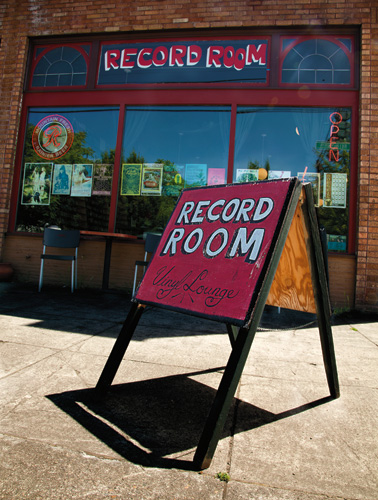 |
Intimidated by the state of the record-store industry, Rachel Rhymes decided to create a cafe vibe–selling beer and wine as well as music–when she opened Record Room in the fall of 2010.// Photos by Sierra Breshears |
When Napster and iTunes made streaming and downloading an option in the late ’90s and early 2000s, the customer base of record stores all but dried up. To compound the situation, big-box stores like Best Buy began selling CDs for cheap, sometimes at a loss, to attract customers to their stores for bigger-ticket items.
As a result, music stores closed in record numbers, and those that remained open struggled to break even, often downsizing or diversifying their product offerings to adapt.
Portland institution Music Millennium closed its second location on NW 23rd Avenue in 2007 and resorted to selling nonmusic merchandise such as posters, T-shirts and novelties like potato guns and flavored crickets.
“We fight every month just to pay our bills,” says owner Terry Currier.
While the store earns enough to pay its employees and utilities, it has not made a profit since 2002 and often falls behind on payments to music-distribution companies.
About five years ago, the resurgence of the vinyl record slowed the music store nosedive, at least somewhat.
Vinyl sales have increased nationally every year since 2007 — 36% from 2010 to 2011, according to Nielsen SoundScan. And while vinyl sales accounted for only 1.2% of the total album sales last year, 67% of vinyl sales took place in independent music shops.
“It’s a very small portion of overall business, but it has a very significant impact on the independent businesses because they are such significant supporters,” says Jim Donio, president of the National Association of Recording Merchandisers.
In an attempt to remedy his situation, Music Millennium’s Currier plans to make some major changes in the coming months, including closing the classical shop adjoining the main store, knocking down the dividing wall and expanding his vinyl section into the additional space.
“I want to get to the point where cash flow is better and I don’t have to deal with credit departments,” he says.
Though the record renaissance occurred across the country, the surge in new establishments is a phenomenon unique to Portland, say industry experts and those in the business.
Unlike New York, San Francisco, Los Angeles and other cultural centers, Portland offers a fertile music scene, a population that supports neighborhood businesses, cheap rents and a relatively inexpensive cost of living.
“We’re one of the few cities that has that combination,” Isaacson says.
When Andrew Neerman opened Beacon Sound in Northeast Portland with Josh Tuntland last August, he was not concerned with the digital threat.
“The digital realm was already established,” he says. “Music Millennium had to deal with the upheaval. We’re riding this new little wavelet that’s almost running counter to the digital.”
Instead, Neerman was more concerned with whether Portland had hit its saturation point with indie record shops. With so many throughout the city, including one now less than a mile away, he had his doubts.
“It seems like a small miracle that we’ve been breaking even,” he says.
While most all of the shops earn enough to pay for themselves and any employees, owners say sometimes just barely. Many supplement their own incomes with side jobs.
“It’s a real scrappy business model,” Isaacson says, likening the small record-shop scene in Portland to that of the city’s food carts. “Get what you can where you can, and throw it together. It’s very DIY, and it’s very small-scale.”
Rachel Rhymes, owner of Record Room on NE Killingsworth Street since October 2010, works at least 60 hours a week without compensating herself for the extra time to keep her doors open.
“I’m the buyer, the grader, the pricer, the bookkeeper, the janitor and the promoter,” she says.
To attract additional business, Rhymes offers beer, wine, pinball and deejayed events in addition to records and cassettes.
“The idea was to be a space where people could come and hang out whether they were buying music or not,” she says. “It’s definitely month-to-month, but it’s wonderful and it’s growing and it’s going to be great.”
White at Clinton Street supports himself with side jobs like deejaying in Portland, Seattle and San Diego, and while he’s still paying off the store’s startup costs on his credit card, the shop funds itself completely.
“I carry pretty hard-to-find stuff,” he says. “I tell people I’ll find them anything and cater to them very directly, which is different from most places.”
For his part, Isaacson supports the Mississippi Records shop by running a record label with the same name from the back room. He has released 125 records, mostly reissues of old blues, gospel and international recordings. While 30% of his business comes through the store, 70% comes through the label.
“If it wasn’t for that, I don’t know that we’d be in business,” he says.
On a Saturday afternoon at Isaacson’s North Albina shop, the sun filters lazily through the half-closed blinds and Rocksteady Fever spins on the turntable. A customer brings three records and three mix-tapes to the sales counter.
“We’ll make it 60 bucks square,” Isaacson says, writing down the album names in the lined notebook he uses instead of a computer system.
The man pays and, leaving the shop, passes under a bright red, hand-lettered sign that reads: “Always … Love Over Gold.”
“It’s a cultural Portland thing,” Isaacson says. “People decide what their dream job is and just go for it, and they find a way to survive.”
Christina Cooke is a Portland-based journalist. She can be reached at [email protected].



